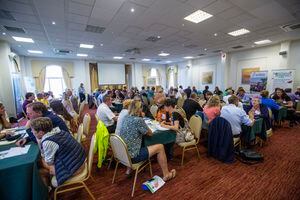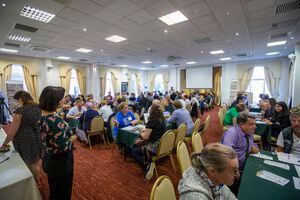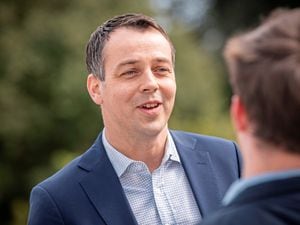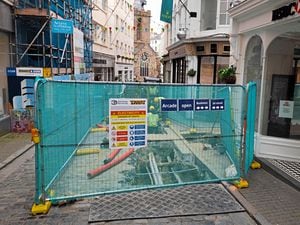Speedy questions on green issues for candidates
ELECTION candidates have been given a grilling by the island’s leading environmentalists and green lobby groups.

Standing Up for Guernsey’s Environment organised a speed-dating style hustings.
There were 76 candidates taking part out of a possible 119, sitting opposite 50 volunteers from 26 different environmental organisations, including La Societe Guernesiaise, the Guernsey Conservation Volunteers and the Guernsey Bicycle Group.
The campaigners were given 90 seconds to set out their stall, and then put the political hopefuls on the spot with questions before the bell rang and they had to play musical chairs and switch tables.
Outgoing deputy Emilie McSwiggan was the ringmaster in charge of the bell, and she kept the proceedings moving and chivvied attendees along with a no-nonsense style.
‘Come along everybody, that’s the bell, time to move around’.
The atmosphere in the room at Les Cotils was a noisy buzz of intense interactions, although it all looked good-natured with a lot of hand-shaking when the bell rang.
At the Pollinator Project table, Gordon Steele wanted more that just vague lip-service from the budding politicians. He was asking them if they would support the strategy for nature, the pesticide action plan, and protect Guernsey’s habitats.

‘It’s interesting some of them say they know all about it, but if we scratch beneath the surface actually their knowledge is skin deep.
‘A second thing is that some of them say it’s difficult because money is tight, but we’ve got a sound business case for investing in the environment that’s based on our tourism industry and agriculture and horticulture, and we’re doing things that maybe the States should be doing for itself.’
At the next table was Kevin Bales, from Guernsey for Freedom, which works against human trafficking and modern slavery locally and around the world.
He explained to candidates the close link between slave labour and environmental destruction.
‘We are getting very strong and positive responses when we ask them about whether Guernsey should have a law against slavery or human trafficking like all the countries around us do, and our guest workers don’t get the same protections and have pretty serious problems compared to other Guernsey workers. Shouldn’t they at least have the same protections? We’ve had very positive responses.’
Nature educationalist Ross Torode was on a table of young people, and he wanted to hear commitments to initiatives such as the electric bike subsidy, and support for teachers to be able to take school pupils outside more.
He had heard a range of views.
‘I’ve certainly felt among some candidates a much stronger connection to nature, they seemed genuinely interested because people who spend their own personal time in nature have a more complex and active understanding of how they can make a difference, so I’ve seen a range and it often seems to stem from a candidate being more involved in nature themselves.’
SUGE is also carrying out a survey of candidates’ views on climate change, biodiversity loss and climate equity.
Once completed, the scores and statements will be published, to help voters easily find out where candidates stand on green issues.





